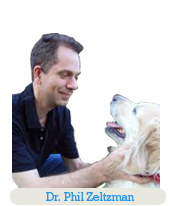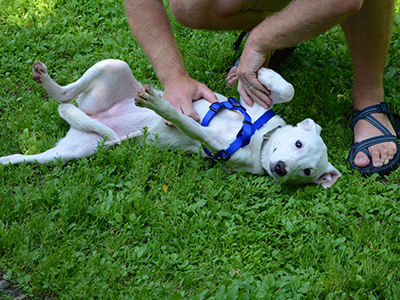
Dr. Phil Zeltzman is a traveling, board-certified surgeon in Allentown, PA. His website is www.DrPhilZeltzman.com. He is the co-author of “Walk a Hound, Lose a Pound” (www.WalkaHound.com).
AJ Debiasse, a technician in Stroudsburg, PA, contributed to this article.

In many situations, surgery is necessary to fix a problem or save a dog’s life. However, here are 7 situations in which caution can keep your dog from ending up on the surgery table, saving you a bundle of time, stress, and money.
1. Use a dog leash
Even the best-behaved dog will feel the call of the wild every now and again. Many instances are uneventful, while others could require surgery. Using a leash can keep your dog from getting hit by a car or chasing another animal into the woods. These behaviors can cause many injuries, from lacerations to orthopedic injures—even losing your dog altogether. Using a leash will prevent your friendly canine from trying to befriend a not-so-nice one. Click here for more about leash safety.
2. Dog proof your home
Some objects, when ingested, don't cause much of an issue. Either they break down during digestion, or they are small enough to pass. However, many foreign objects get stuck in the stomach and/or the intestine, requiring surgery to be removed. At worst, parts of intestines may get damaged enough to require removal. To avoid this risk altogether, dog proof your house by keeping all questionable items out of your dog's reach. This may require the use of child locks, closing off certain rooms, keeping counters clean or removing toxic plants. Unfortunately, it is difficult to assess what your dog may get into until it’s too late. They are very creative!
3. Tack your dog’s stomach
Large and giant breed dogs are prone to a life-threatening condition called bloat or stomach torsion. Primarily in dogs with a deep chest, the stomach can twist around. This major emergency requires surgery. Too few dog owners are aware that there is a preventive procedure called a gastropexy. The stomach is tacked or sutured to the inside of the abdomen to prevent it from twisting. This can be done any time the abdomen is opened for any other reason:
- Spaying
- Removal of a foreign body
- Removal of bladder stones
If no other surgery is planned, the gastropexy can be done independently. Click here to learn more about gastropexy.
4. Remove masses early
Board-certified surgeons commonly remove skin masses, typically because they became too large to be removed by the family veterinarian. More extensive (and expensive) surgery can often be avoided by having small masses removed early on. Early intervention also decreases the risk of cancer cells spreading.
5. Help your dog lose weight
When dogs carry extra weight, many organs and systems can be negatively affected. This includes the joints, starting with ACL (anterior cruciate ligament) tears.
6. Consider genes before you adopt
I encourage you to adopt from a shelter. However, because of inbreeding, all sorts of genetic disorders can rear their ugly heads. Learn as much as you can about a dog’s lineage before you adopt.
7. Spay or neuter
Spaying prevents diseases of the ovaries and uterus. If it’s done before the first heat, spaying can virtually eliminate the risk of breast tumors. Neutering prevents conditions of the testicles and roaming in search of cute females—which is a classic way to get hit by a car. Click here to see an example of why spaying is so important.
This list is by no means exhaustive; feeding your dog a proper diet, teaching your dog not to jump or run away and much more can also prevent all kinds of problems. Talk to your veterinarian and ask for more precautionary advice. You might think that it’s ironic for a surgeon to tell you how to avoid surgery, but I sincerely hope you follow the advice. It can save you a significant amount of headache, and can help your dog stay out of the operating room.
If you have any questions or concerns, you should always visit or call your veterinarian -- they are your best resource to ensure the health and well-being of your pets.
